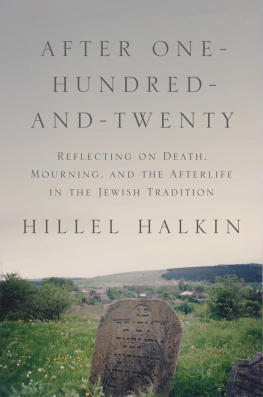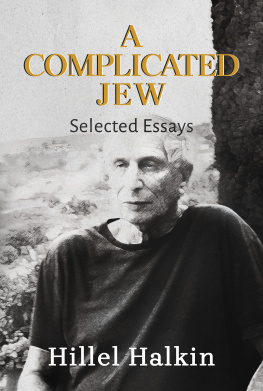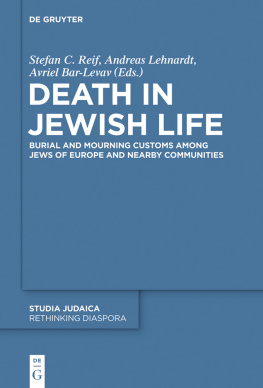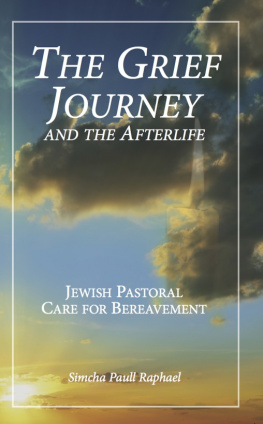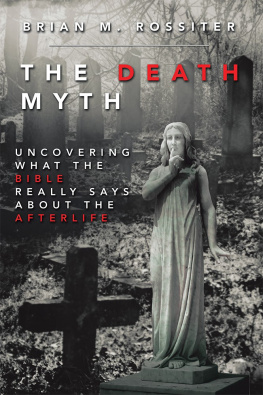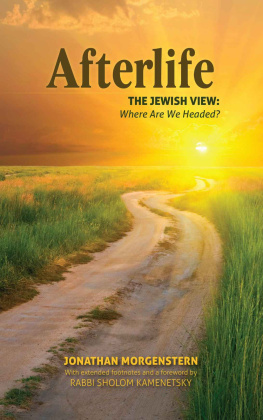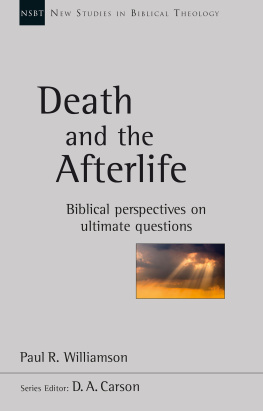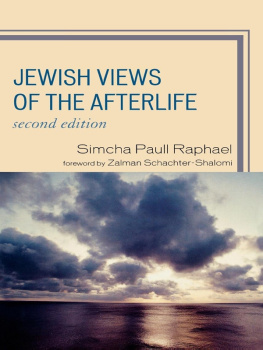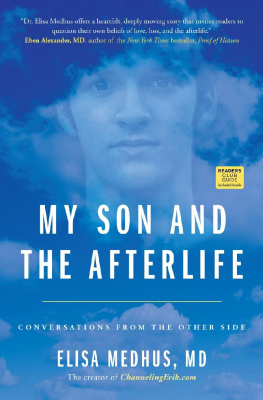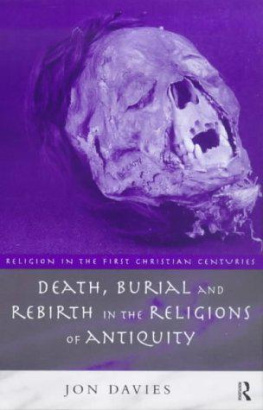
AFTER ONE-HUNDRED-AND-TWENTY
LIBRARY OF JEWISH IDEAS
Cosponsored by the Tikvah Fund

The series presents engaging and authoritative treatments of core Jewish concepts in a form appealing to general readers who are curious about Jewish treatments of key areas of human thought and experience.
AFTER ONE-HUNDRED-AND-TWENTY
REFLECTING ON DEATH, MOURNING, AND THE AFTERLIFE IN THE JEWISH TRADITION
HILLEL HALKIN
PRINCETON UNIVERSITY PRESS
Princeton and Oxford
Copyright 2016 by Princeton University Press
Published by Princeton University Press, 41
William Street, Princeton, New Jersey 08540
In the United Kingdom: Princeton University Press, 6
Oxford Street, Woodstock, Oxfordshire OX20 1TR
press.princeton.edu
Jacket photograph provided by the author
All Rights Reserved
Library of Congress Cataloging-in-Publication Data
Halkin, Hillel, 1939 author.
After one-hundred-and-twenty : reflecting on death, mourning, and the afterlife in the Jewish tradition / Hillel Halkin.
pages cm. (Library of Jewish ideas)
Includes bibliographical references.
ISBN 978-0-691-14974-5 (hardcover : alk. paper) ISBN 0-691-14974-7 (hardcover : alk. paper) 1. DeathReligious aspectsJudaism. 2. Jewish mourning customs. I. Title. II. Title: After 120.
BM635.4.H35 2016
296.3'3dc23
2015033172
British Library Cataloging-in-Publication Data is available
Publication of this book has been aided by the Tikvah Fund
Excerpts in Chapter 2 from The Book of Legends/Sefer ha-Aggadah: Legends from the Talmud and Midrash by Hayyim Nahman Bialik, copyright 1992 by Schocken Books, a division of Random House LLC. Used by permission of Schocken Books, an imprint of the Knopf Doubleday Publishing Group, a division of Penguin Random House LLC. All rights reserved.
This book has been composed in Serlio and Linux Libertine
Printed on acid-free paper.
Printed in the United States of America
1 2 3 4 5 6 7 8 9 10
Contents
AFTER ONE-HUNDRED-AND-TWENTY
BY WAY OF AN INTRODUCTION
A FRIEND ASKED ME WHY I WANTED TO WRITE THIS BOOK and I said, Well, they say death is a foreign country. At my age, its time to start thinking about the travel arrangements.
Good idea, he said. If you dont like them, you can always go somewhere else.
Touch!
We joke about death for the same reasons that we joke about other frightening things. Because they are frightening. Because laughter is a defense against fear. Because it can be a victory over fear, a way of acknowledging fears existence while demonstrating that it hasnt gotten the better of us.
But we also joke about death because, from a certain angle, it is funny. Nothing could be more preposterous. One minute youre a breathing, sentient being and the next youre a lump of senseless matter. Its the ultimate disappearing act: now I see you, now I dont. Even little babies laugh at that.
Except that they dont, not really. What babies laugh at is: now I see you, now I dont, now I see you again. A great deal of humankinds thinking about death has taken its cue from that.
And the potential humor in the poof! its gone of a life is only there in a life already lived. A joke about the death of an elderly person that makes us laugh would be cruel if told about a young one.
As a boy, my fear of death was no joke. I remember exactly how it started. I was eleven or twelve, at home from school with a fever. By my bed was a copy of Readers Digest. In it was an article about leprosy. This was, it turned out, a real disease that caused disfigurement and could kill you, not just a biblical affliction in the book of Leviticus that my class had studied in the Jewish school I attended. It sometimes started with white spots on the skin.
The next day I noticed a small white spot on the underside of my arm. I had leprosy. I would die.
I dont remember how long my leprosy lasted. In the end, the spot grew no larger, no new ones appeared, and it was clear that nothing was wrong with me.
But that was just the beginning. In the years to come, I contracted one fatal disease after another: polio, brain cancer, leukemia, multiple sclerosis, muscular dystrophy. One summer I had rabies after being nipped on a knuckle by a dog. Rabies, if you werent immunized at once, was fatal. The incubation period was up to sixty days. For sixty days, I waited for the signs of it.
In retrospect, this, too, can seem funny. Ive regaled friends with accounts of it. At the time, though, I lived with intermittent terror.
Intermittent jubilation as well: the jubilation of the sixty-first day. I would live! Life never seemed so bounteous, so luminously full of promise, as it did then.
The oddest part of it was that I never shared my fears with anyone. Had I told my parents, they might have looked at my nipped finger and either taken me to a doctor or told me to stop worrying. But that would have spoiled the game I was playing with death.
And it was a game, although it took me many years to understand that. I couldnt have said at the time what imagined threat or crime made me think I was living on death row; whatever it was, though, I sat in my cell expecting the knock to come. I could only escape death by outwitting it, which I did by tricking it into thinking it neednt trouble itself because I was already fatally stricken. I was playing dead like a mouse in the claws of a cat and doing it so well that I was fooled by my own ruse.
This went on for a while. It was my secret. Nothing about me gave it away. I was a top student in my New York public high school. I won track medals and literary prizes. I did the things that boys my age did and had the fun that boys my age had. No one could have guessed that I lay in bed at night praying for another year of the life I desperately craved.
Eventually, I outgrew it. Or rather, I traded my boyhood hypochondria for a more stable, long-term arrangement. I no longer had this or that fatal condition. The fatal condition was now simply being me. I was doomed to die youngif not this year, then the next or the year after that. At fifteen, I didnt think I would reach twenty. This, too, was apparently good enough for death, because it continued to leave me alone. Perhaps by then it had lost all interest in me.
I should have realized it had never had any in the first place. The summer I was nineteen, a friend and I bought a used car and drove it to Mexico City. Although I had only gotten my drivers license a week before setting out, this seemed no disqualification. And in fact, it was my friend, not I, who was driving when we had the accident.
We were on a mountainous stretch of a narrow, winding road quaintly called the Pan-American Highway. On one side was a sheer drop to a ravine far below. A light rain was falling As we started to skid, my friend had one hand on the wheel and was singing with his head halfway out the window. I was spreading mustard on a sandwich. The last thing I remember thinking before we plunged off the ravine side of the road into the single tree growing beside it was, Damn, I wanted to eat this sandwich! The tree stopped us with a jolt. The car was more banged up than we were.
If death had been looking for a chance to finish me off, it was more incompetent than I had imagined.
Yet even this did not quite convince me. The conclusion I drew was a different one. Death still had me in its sights. I just had, it now turned out, an ally that was protecting me, a private angel or daemon. As long as I kept faith with it, it would keep faith with me.
Next page
